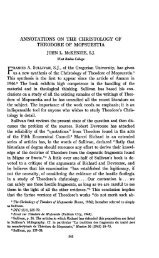Two Concepts of Attrition and Contrition - Theological Studies
Two Concepts of Attrition and Contrition - Theological Studies
Two Concepts of Attrition and Contrition - Theological Studies
Create successful ePaper yourself
Turn your PDF publications into a flip-book with our unique Google optimized e-Paper software.
4 THEOLOGICAL STUDIES<br />
sacrament <strong>and</strong> it need not make room for contrition at the infusion <strong>of</strong><br />
sanctifying grace. For these, "vi clavium ex attrito non fit contritus."<br />
The two positions are different indeed; both schools agree to say so.<br />
The first emphatically states that our modern theology has deviated<br />
from the authentic teaching <strong>of</strong> St. Thomas <strong>and</strong> advocates a return<br />
to it. The latter acknowledges this deviation but sees in the called-for<br />
return to St. Thomas a regress made well nigh impossible by the teaching<br />
<strong>of</strong> Trent. 5<br />
One thing seems to become evident from the recent controversial<br />
studies. There are two different ideas <strong>of</strong> contrition <strong>and</strong> attrition, so<br />
different indeed that the same terms or concepts when used by authors<br />
<strong>of</strong> opposite schools do not cover exactly the same reality. The controversialists<br />
themselves on both sides are not unaware <strong>of</strong> this. 6<br />
If so, if contrition according to St. Thomas does not perfectly<br />
coincide with the contrition <strong>of</strong> the moderns, <strong>and</strong> if what St. Thomas<br />
meant by attrition is not exactly the same sorrow for sin which the<br />
moderns so term, should not then a way out <strong>of</strong> the confusion <strong>and</strong> an<br />
approach to mutual comprehension start from an accurate analysis <strong>of</strong><br />
what each <strong>of</strong> the systems means by them? Strangely enough, except<br />
for some passing remarks which are left unexploited, 7 this precise outline<br />
<strong>of</strong> the status quaestionis seems to have been overlooked almost<br />
completely.<br />
In the following pages we intend to determine as accurately as possible<br />
the ideas which the veteres on one h<strong>and</strong> <strong>and</strong> the hodiemi on the<br />
5 Cf. P. de Vooght, La Theologie, p. 77; H. Dondaine, op. cit., pp. 46-60, ch. 4, "Retour<br />
a Saint Thomas"; J. de Blic, op. cit., pp. 337, 357-58. It may strike one how nearly all<br />
historical studies on the theology <strong>of</strong> penance tacitly assume that the history <strong>of</strong> the penitential<br />
doctrine goes in a uniformly progressive direction. Cf. for example the long <strong>and</strong><br />
instructive study <strong>of</strong> A. Michel, "Penitence," in the Dictionnaire de TMologie catholique,<br />
XII, 748-1127. Yet one may well ask the question whether the deviation from St. Thomas'<br />
teaching in the theology <strong>of</strong> penance means a real progress. P. de Vooght, op. cit., p. 77, is<br />
convinced that it is not. And he may well be right. That deviation set in at a time <strong>of</strong> low<br />
level scholasticism. This by itself is not a favourable sign.<br />
6 Cf. De Blic, op. cit., p. 351; De Vooght, La Theologie, p. 81.<br />
7 Cf. De Blic, loc. cit., n. 1. On p. 339, n. 3, he remarked that for St. Thomas it would<br />
be contradictory to speak <strong>of</strong> the attrition <strong>of</strong> a soul in a state <strong>of</strong> grace. Yet in pp. 358-61,<br />
he develops a long pro<strong>of</strong> to show that attrition need not be informis. He obviously means<br />
here by attrition something different from what St. Thomas meant by it. Note also P.<br />
de Vooght, La Justification, pp. 255 f., on the practical requirements <strong>of</strong> Thomist contrition<br />
<strong>and</strong> <strong>of</strong> modern attrition.

















